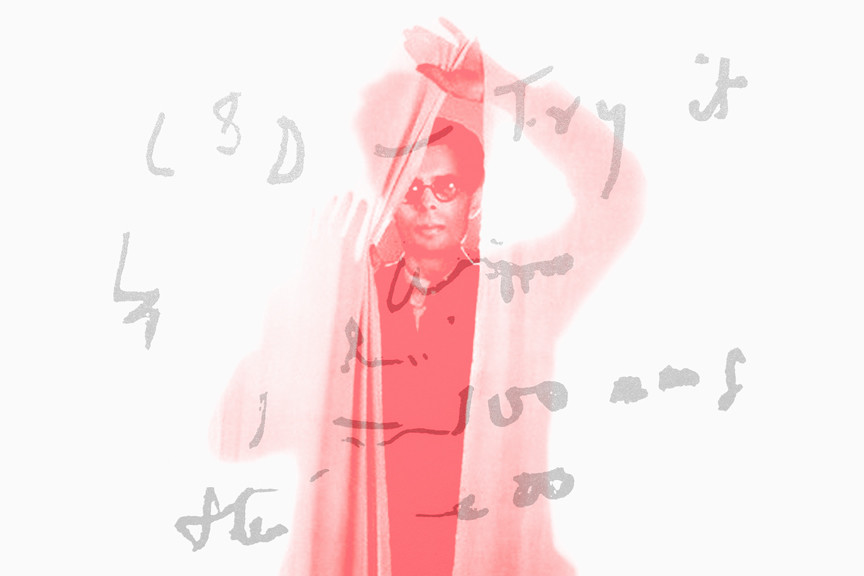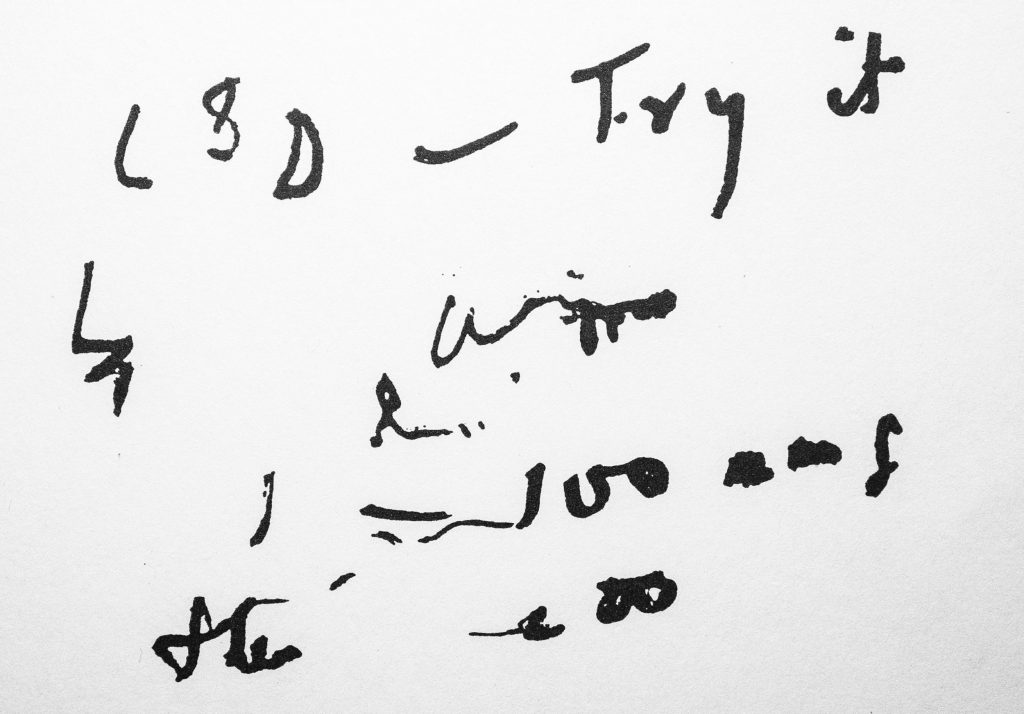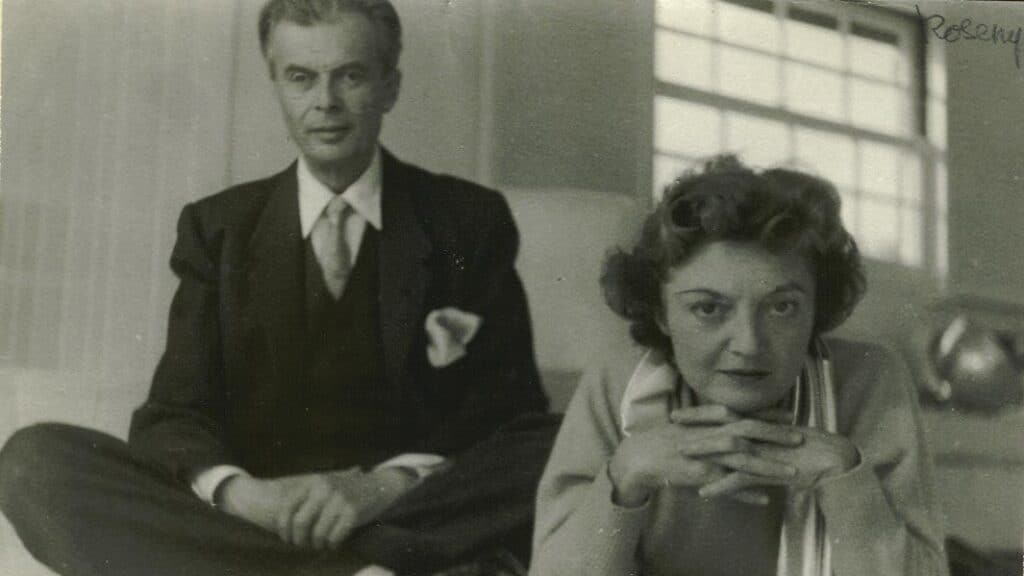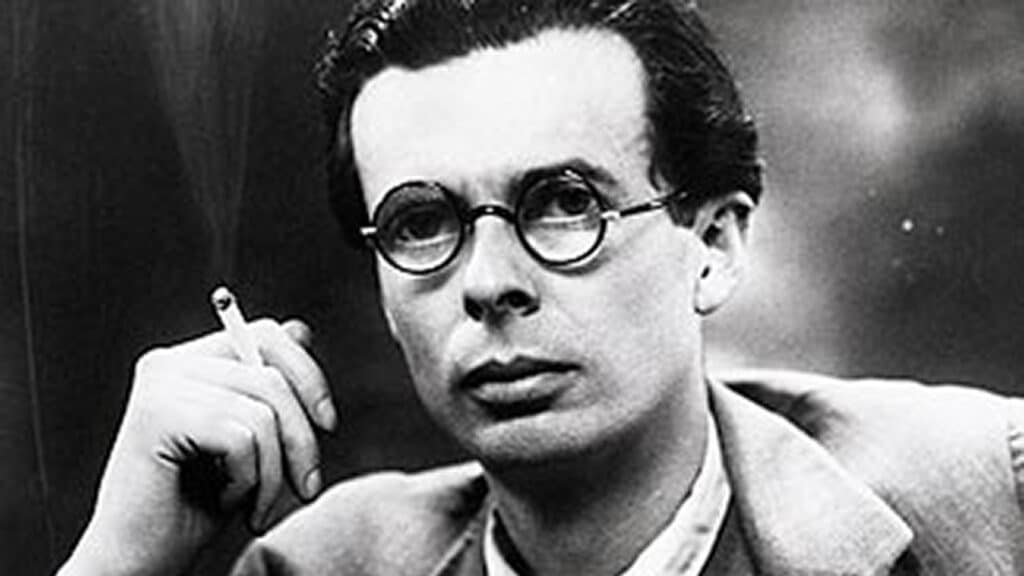A Strange New World: A Tribute to Aldous Huxley 53 Years After His Death
“LSD, 100 MCG, intramuscular”

Psymposia is a 501(c)(3) nonprofit research and media organization that offers critical perspectives on drugs, politics, and culture. We rely on contributions from our readers and listeners. Your support is vital to sustaining Psymposia.
Support Psymposia’s independent journalism on Patreon and help us drive the Mystery Machine! We’re a bunch of meddling kids who are unmasking the latest shenanigans on the psychedelics beat.
The following consists of excerpts from The Most Beautiful Death, a letter written by Laura Huxley, wife of psychedelic pioneer Aldous Huxley, to his brother Julian, about his experience with LSD on his deathbed and leading up to his final moments on November 22, 1963.
There is so much I want to tell you about the last week of Aldous’ life and particularly the last day.
What happened is important not only for us close and loving but it is almost a conclusion, better, a continuation of his own work, and therefore it has importance for people in general… It seemed obvious and transparent that subconsciously he knew that he was going to die. But not once consciously did he speak of it.
This had nothing to do with the idea that some of his friends put forward, that he wanted to spare me. It wasn’t this, because Aldous had never been able to play a part, to say a single lie; he was constitutionally unable to lie.
During the last two months I gave him almost daily an opportunity, an opening for speaking about death, but of course this opening was always one that could have been taken in two ways – either towards life or towards death, and he always took it towards life.
We read the entire manual of Dr. Leary extracted from The Book of the Dead.
He could have, even jokingly said don’t forget to remind me his comment instead was only directed to the way Dr. Leary conducted his LSD sessions, and how he would bring people, who were not dead, back here to this life after the session.
It is true he said sometimes phrases like, “If I get out of this,” in connection to his new ideas for writing, and wondered when and if he would have the strength to work. His mind was very active and it seems that this Dilaudid had stirred some new layer which had not often been stirred in him.
“If I die.” This was the first time that he had said that with reference to now. He wrote it. I knew and felt that for the first time he was looking at this. About a half an hour before I had called up Sidney Cohen, a psychiatrist who has been one of the leaders in the use of LSD.
I had asked him if he had ever given LSD to a man in this condition. He said he had only done it twice actually, and in one case it had brought up a sort of reconciliation with Death, and in the other case it did not make any difference. I asked him if he would advise me to give it to Aldous in his condition.
I told him how I had offered it several times during the last two months, but he always said that he would wait until he was better. Then Dr. Cohen said, “I don’t know. I don’t think so. What do you think?” I said, “I don’t know. Shall I offer it to him?” He said, “I would offer it to him in a very oblique way, just say ‘what do you think about taking LSD [sometime again]?’”
This vague response had been common to the few workers in this field to whom I had asked, “Do you give LSD in extremes?” Island is the only definite reference that I know of.
I must have spoken to Sidney Cohen about nine-thirty. Aldous’ condition had become so physically painful and obscure, and he was so agitated he couldn’t say what he wanted, and I couldn’t understand.
Then I don’t know exactly what time it was, he asked for his tablet and wrote, “Try LSD 100 intramuscular.”
Although as you see from this photo static copy it is not very clear, I know that this is what he meant. I asked him to confirm it. Suddenly something became very clear to me. I knew that we were together again after this torturous talking of the last two months.
I knew then, I knew what was to be done. I went quickly into the cupboard in the other room where Dr. Bernstein was, and the TV which had just announced the shooting of Kennedy.
I took the LSD and said, “I am going to give him a shot of LSD, he asked for it.” The doctor had a moment of agitation because you know very well the uneasiness about this drug in the medical mind. Then he said, “All right, at this point what is the difference.”
Whatever he had said, no “authority,” not even an army of authorities could have stopped me then. I went into Aldous’ room with the vial of LSD and prepared a syringe. The doctor asked me if I wanted him to give him the shot – maybe because he saw that my hands were trembling.
His asking me that made me conscious of my hands, and I said, “No I must do this.” I quieted myself, and when I gave him the shot my hands were very firm. Then, somehow, a great relief came to us both. I believe it was 11:20 when I gave him his first shot of 100 microgrammes.

I sat near his bed and I said, “Darling, maybe in a little while I will take it with you. Would you like me to take it also in a little while?”
I said a little while because I had no idea of when I should or could take it, in fact I have not been able to take it to this writing because of the condition around me. And he indicated “yes.”
We must keep in mind that by now he was speaking very, very little. Then I said, “Would you like Matthew to take it with you also? And he said, “Yes.” “What about Ellen?” He said, “Yes.”
Then I mentioned two or three people who had been working with LSD and he said, “No, no, basta, basta.” Then I said, “What about Jinny?” And he said, “Yes,” with emphasis. Then we were quiet. I just sat there without speaking for a while.
Aldous was not so agitated physically. He seemed – somehow I felt he knew, we both knew what we were doing, and this has always been a great relief to Aldous. I have seen him at times during his illness very upset until he knew what he was going to do, then even if it was an operation or X-ray, he would make a total change.
This enormous feeling of relief would come to him, and he wouldn’t be worried at all about it, he would say let’s do it, and we would go to it and he was like a liberated man. And now I had the same feeling – a decision had been made, he made the decision again very quickly.
Suddenly he had accepted the fact of death; he had taken this moksha medicine (LSD) in which he believed. He was doing what he had written in Island, and I had the feeling that he was interested and relieved and quiet.
After half an hour, the expression on his face began to change a little, and I asked him if he felt the effect of LSD, and he indicated no. Yet, I think that a something had taken place already.
This was one of Aldous’ characteristics. He would always delay acknowledging the effect of any medicine, even when the effect was quite certainly there, unless the effect was very, very strong he would say no.
Now, the expression of his face was beginning to look as it did every time that he had the moksha medicine, when this immense expression of complete bliss and love would come over him.
This was not the case now, but there was a change in comparison to what his face had been two hours ago. I let another half hour pass, and then I decided to give him another 100 mcg. I told him I was going to do it, and he acquiesced. I gave him another shot, and then I began to talk to him.
He was very quiet now; he was very quiet and his legs were getting colder; higher and higher I could see purple areas of cynosis.

Then I began to talk to him, saying, “Light and free.”
Some of these thing I told him at night in these last few weeks before he would go to sleep, and now I said it more convincingly, more intensely – “go, go, let go, darling; forward and up. You are going forward and up; you are going towards the light. Willing and consciously you are going, willingly and consciously, and you are doing this beautifully; you are doing this so beautifully – you are going towards the light; you are going towards a greater love; you are going forward and up.
It is so easy; it is so beautiful. You are doing it so beautifully, so easily. Light and free. Forward and up. You are going towards Maria’s love with my love. You are going towards a greater love than you have ever known. You are going towards the best, the greatest love, and it is easy, it is so easy, and you are doing it so beautifully.”
I believe I started to talk to him – it must have been about one or two o’clock. It was very difficult for me to keep track of time.
The nurse was in the room and Rosalind and Jinny and two doctors – Dr. Knight and Dr. Cutler. They were sort of far away from the bed. I was very, very near his ears, and I hope I spoke clearly and understandingly. Once I asked him, “Do you hear me?”
He squeezed my hand. He was hearing me.
I was tempted to ask more questions, but in the morning he had begged me not to ask any more questions, and the entire feeling was that things were right.
I didn’t dare to inquire, to disturb, and that was the only question that I asked, “Do you hear me?” Maybe I should have asked more questions, but I didn’t.
Later on I asked the same question, but the hand didn’t move any more. Now from two o’clock until the time he died, which was five-twenty, there was complete peace except for once. That must have been about three-thirty or four, when I saw the beginning of struggle in his lower lip.
His lower lip began to move as if it were going to be a struggle for air. Then I gave the direction even more forcefully. “It is easy, and you are doing this beautifully and willingly and consciously, in full awareness, in full awareness, darling, you are going towards the light.” I repeated these or similar words for the last three or four hours.
Once in a while my own emotion would overcome me, but if it did I immediately would leave the bed for two or three minutes, and would come back only when I could dismiss my emotion.
The twitching of the lower lip lasted only a little bit, and it seemed to respond completely to what I was saying.
“Easy, easy, and you are doing this willingly and consciously and beautifully – going forward and up, light and free, forward and up towards the light, into the light, into complete love.”
The twitching stopped, the breathing became slower and slower, and there was absolutely not the slightest indication of contraction, of struggle. It was just that the breathing became slower – and slower – and slower, and at five-twenty the breathing stopped.
I had been warned in the morning that there might be some upsetting convulsions towards the end, or some sort of contraction of the lungs, and noises. People had been trying to prepare me for some horrible physical reaction that would probably occur.
None of this happened, actually the ceasing of the breathing was not a drama at all, because it was done so slowly, so gently, like a piece of music just finishing in a sempre piu piano dolcemente.
I had the feeling actually that the last hour of breathing was only the conditioned reflex of the body that had been used to doing this for 69 years, millions and millions of times. There was not the feeling that with the last breath, the spirit left. It had just been gently leaving for the last four hours.
In the room the last four hours were two doctors, Jinny, the nurse, Rosalind Roger Gopal – you know she is the great friend of Krishnamurti, and the directress of the school in Ojai for which Aldous did so much. They didn’t seem to hear what I was saying.
I thought I was speaking loud enough, but they said they didn’t hear it. Rosalind and Jinny once in a while came near the bed and held Aldous’ hand. These five people all said that this was the most serene, the most beautiful death. Both doctors and nurse said they had never seen a person in similar physical condition going off so completely without pain and without struggle.

We will never know if all this is only our wishful thinking, or if it is real, but certainly all outward signs and the inner feeling gave indication that it was beautiful and peaceful and easy.
And now, after I have been alone these few days, and less bombarded by other people’s feelings, the meaning of this last day becomes clearer and clearer to me and more and more important. Aldous was, I think (and certainly I am) appalled at the fact that what he wrote in Island was not taken seriously.
It was treated as a work of science fiction, when it was not fiction because each one of the ways of living he described in Island was not a product of his fantasy, but something that had been tried in one place or another and some of them in our own everyday life.
If the way Aldous died were known, it might awaken people to the awareness that not only this, but many other facts described in Island are possible here and now. Aldous’ asking for moksha medicine while dying is a confirmation of his work, and as such is of importance not only to us, but to the world.
It is true we will have some people saying that he was a drug addict all his life and that he ended as one, but it is history that Huxleys stop ignorance before ignorance can stop Huxleys.
Even after our correspondence on the subject, I had many doubts about keeping Aldous in the dark regarding his condition. It seemed not just that, after all he had written and spoken about death, he should be left to go into it unaware.
And he had such complete confidence in me – he might have taken it for granted that had death been near I certainly would have told him and helped him. So my relief at his sudden awakening at his quick adjusting is immense. Don’t you feel this also?
Now, is his way of dying to remain our, and only our relief and consolation, or should others also benefit from it? What do you feel?
Hey! Before you go… Psymposia is a 501(c)(3) non-profit media organization that offers critical perspectives on drugs, politics, and culture. We strive to ask challenging questions, and we’re committed to independent reporting, critical analysis, and holding those who wield power accountable.
Our perspectives are informed by critical analysis of the systemic crises of capitalism that have directly contributed to the unmitigated growth of addiction, depression, suicide, and the unraveling of our social relations. The same economic elite and powerful corporate interests who have profited from causing these problems are now proposing “solutions”—solutions which both line their pockets and mask the necessity of structural change.
In order for us to keep unpacking these issues and informing our audience, we need your continuing support. You can sustain Psymposia by becoming a supporter for as little as $2 a month.





